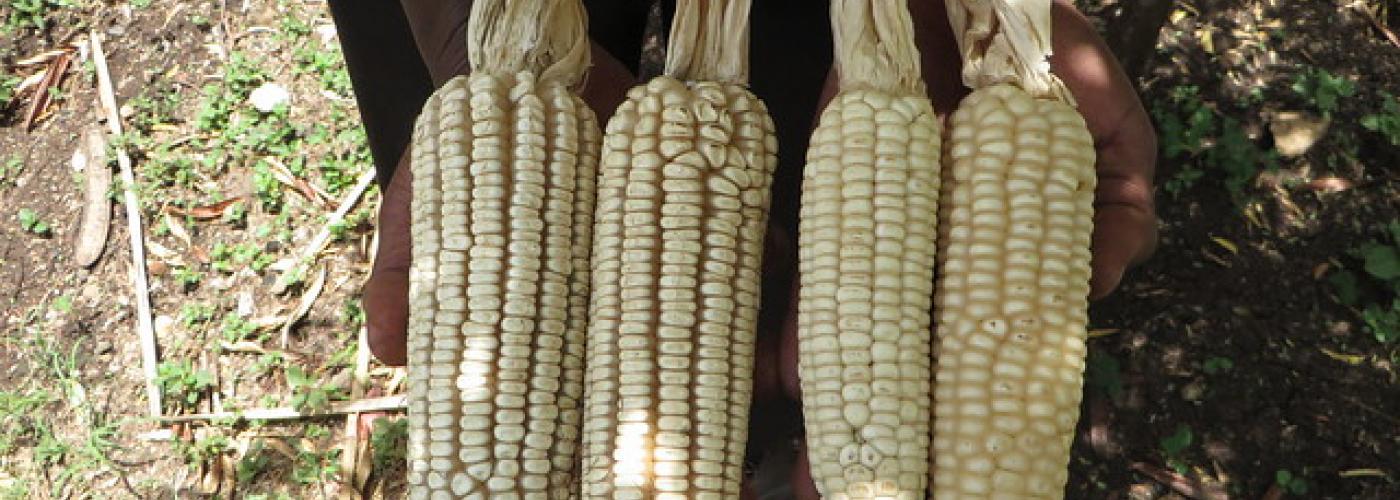Fueling the Nigerian Maize Sector with a Pay-for-Results “Nudge”
Image

You can’t see or smell them, but aflatoxins are one of the world’s most carcinogenic substances. They are produced by a group of molds known as the Aspergillus fungi that often contaminate grains, such as maize. Aflatoxin-contaminated food can increase the risk of cancer and is associated with childhood stunting. In Nigeria, where smallholder farmers produce over 70% of the nation’s maize crop, aflatoxins compromise livelihoods and endanger lives.
During the 2013 season, there was a high incidence of aflatoxins in maize selling on the Nigerian market. Despite the health risks, consumption of aflatoxin-contaminated maize continued, particularly among smallholder farmers. Underlying these economic and health impacts was a deeper awareness issue: Not enough actors in the maize value chain knew about the contamination or how to tackle it. As far as the industry knew, there was no accessible proven solution to help smallholder farmers produce aflatoxin-reduced maize.
Yet the market opportunity was there. In fact, the scientific product already existed: AflasafeTM. The International Institute of Tropical Agriculture (IITA) had tested this biocontrol agent and found that it crowds out 80-99% of aflatoxins if applied at the right time during the cropping season. If private sector actors moved into this space and commercialized the proven solution, an entirely new market could develop. But something needed to incite the change.
Due to the existing uncertainty around food safety in the maize sector, the best way to achieve rapid adoption and scale was to provide a “nudge” that would motivate private sector actors to take that first step.
The nudge manifested as the Nigeria Aflasafe Challenge Project, launched by AgResults in 2013. The objective of this Pay-for-Results (PfR) project was to reduce aflatoxin contamination in maize by catalyzing the private sector to deliver AflasafeTM to smallholder farmers.
First, AgResults identified and motivated private sector actors who were integral to the maize value chain to participate: grain traders, input suppliers, farmer co-ops, and processors./p>
Second, AgResults designed a prize competition where maize aggregators would receive an $18.75 premium for each metric ton of AflasafeTM-treated maize they aggregated. This financial prize increased their margin, thereby lowering their risk to pursue this new line of business.
Uptake by farmers was slow in the first two years. Raising awareness of the problem and solution presented a challenge for AgResults. Smallholder farmers and maize aggregators had to be convinced that AflasafeTM worked and was worth the extra effort and cost. There were also financial constraints: The aggregators purchased AflasafeTM upfront on behalf of their farmers and usually had to wait until several weeks after the harvest to get paid, making access to finance a critical step. Often, the aggregators also needed to provide financing for maize purchases — an enormous financial commitment in a business with traditionally very low margins.
Motivated by the prize and convinced of the product’s benefits, aggregators eventually entered the market and seized the opportunity. They provided AflasafeTM and other inputs to smallholder farmers and developed relationships with them with the intention of scaling up sales. To tackle the issues of awareness and correct application, they incorporated training into their suite of services. Each year, they reinvested their prizes into training, storage, and equipment to grow their businesses; in some cases, they achieved significant scale.
As the food industry became aware of the benefits of aflatoxin-reduced maize, a new premium market emerged, touting the benefits for human consumption as well as for the poultry, swine, and aquaculture sectors. Maize aggregators have differentiated the product with tailored packaging, branding, and marketing, and on average buyers have been willing to pay 8.5% above market price for this higher-quality and safer product.
This premium may not seem high, but for a commodity such as maize, it represents an enormous price difference. It also indicates the value that buyers have begun to place on a clean product. Importantly, competitors will earn more revenue from the premium price than from the prize — a big step forward in creating a sustainable market.
In five years, 41 aggregators participated in the competition, providing AflasafeTM to more than 25,000 smallholder farmers. As of April 2019, over 213,562MT of AflasafeTM-treated maize has been aggregated.
AgResults was well-positioned to jumpstart the market for AflasafeTM using a private sector-focused “nudge” for several reasons:
- The Pay-for-Results approach – AgResults’ use of a monetary prize in the competition encouraged the private sector with a concrete economic incentive. By giving aggregators the freedom to determine how to work with farmers and buyers, competitors were free to innovate as they saw fit.
- A product that really works – Without the painstakingly tested AflasafeTM biocontrol, it would have been nearly impossible to galvanize a new maize value chain to combat aflatoxins. However, AflasafeTM was already scientifically proven, so the project could focus on raising awareness and changing behaviors.
- IITA’s global reputation – AgResults may have been an unknown entity in the Nigerian maize sector, but IITA was not. With its strong presence and an established reputation, IITA provided the credibility that aggregators needed to buy into the prize competition.
- The absence of government distortions – Government agriculture and trade policies can often distort the market, but this was not the case in the Nigerian maize market. The political enabling environment was not restrictive and enabled the project to function within its parameters.
A variety of development approaches could have been effective in scaling up adoption of AflasafeTM. Yet with its “nudge,” AgResults created an effective incentive to help to solve a pressing public health issue and fostered a lucrative market opportunity for the actors who can drive a long-term and sustainable transformation.
Funded by USAID (US), DFID (UK), DFAT (Australia), Global Affairs Canada, and the Bill and Melinda Gates Foundation, AgResults has designed and implemented prize competitions since 2013 focused on spurring fundamental change in market relationships between the private sector and smallholder farmers.

